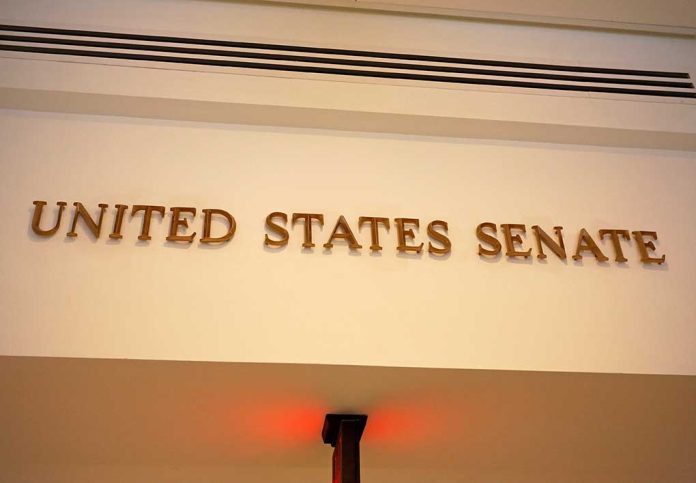
Texas passes a groundbreaking DOGE bill to cut red tape and shrink government, following in the footsteps of Trump’s federal efficiency initiatives.
Key Takeaways
- Texas Senate Bill 14 (SB14) has passed, establishing the Texas Regulatory Efficiency Office aimed at streamlining state regulations.
- The initiative draws inspiration from President Trump’s Department of Government Efficiency, focusing on reducing unnecessary rules and bureaucracy.
- A diverse advisory panel will provide expertise from regulated businesses, education, occupational license holders, and state agencies.
- The bill includes requirements for biennial reporting and a public website to increase regulatory transparency.
- Lt. Gov. Dan Patrick supports the measure for its potential to save money for taxpayers and businesses while boosting economic growth.
Texas Senate Approves Regulatory Reform Office
The Texas Senate has passed Senate Bill 14, an innovative piece of legislation that establishes the Texas Regulatory Efficiency Office. The bill, nicknamed the DOGE bill, represents Texas’ commitment to streamlining government operations and reducing bureaucratic obstacles that hamper business growth and economic development. Following the successful model of President Trump’s federal efficiency initiatives, the Texas version aims to identify and eliminate redundant regulations while improving government performance.
SB14 directly addresses the procedures state agencies use to adopt rules and impose regulatory requirements. It also examines the deference courts give to state agencies’ interpretations of laws and rules during judicial proceedings. This comprehensive approach seeks to rebalance the relationship between government agencies and the citizens they serve, ensuring regulations serve their intended purpose without creating unnecessary burdens.
Advisory Panel and Transparency Measures
A key component of the new regulatory efficiency framework is the creation of a diverse advisory panel. This group will include representatives from regulated businesses, the public, occupational license holders, higher education institutions, and state agencies. The panel structure ensures perspectives from various stakeholders affected by state regulations inform the decision-making process, providing practical insights into how rules impact different sectors.
Transparency stands as a foundational element of the new office. The legislation requires the Texas Regulatory Efficiency Office to submit a biennial report to the governor and the Legislative Budget Board detailing its operations and accomplishments. Additionally, the bill calls for developing an interactive website to increase public access to regulatory information, allowing citizens and businesses to more easily navigate state requirements.
The Texas Senate passed legislation Wednesday that would essentially create an efficiency office similar to the recently created Department of Government Efficiency (DOGE). https://t.co/fkbAorfDnT
— Spectrum News 1 Texas (@SpectrumNews1TX) March 27, 2025
Political Support and Economic Benefits
Lieutenant Governor Dan Patrick has emerged as a prominent supporter of the initiative, emphasizing its potential economic benefits. The bill aligns with conservative principles of limited government and fiscal responsibility, promising to save money for taxpayers and businesses by eliminating costly and inefficient regulatory processes. These savings could translate into increased economic activity and job creation throughout Texas.
The DOGE bill specifically targets bureaucratic red tape that hampers small business growth. By streamlining regulations and reducing compliance costs, Texas aims to create a more business-friendly environment that encourages entrepreneurship and investment. This approach resonates with the state’s long-standing commitment to economic liberty and its reputation as one of the nation’s most business-friendly states.
Next Steps in the Legislative Process
Having cleared the Senate, SB14 now moves to the House committee for further consideration before receiving a vote in the Texas House of Representatives. The bill is categorized under several important subject areas including Business & Commerce, Courts, Governor, State Agencies’ Rules, and the Regulatory Reform & Efficiency Act, highlighting its broad scope and significance for governance in Texas.
If enacted, the Texas Regulatory Efficiency Office would join similar efforts in other conservative-led states seeking to reduce government interference in the economy. This wave of regulatory reform initiatives reflects growing recognition that excessive regulation often stifles growth and innovation while increasing costs for consumers and businesses alike, without necessarily achieving better outcomes.
Sources:
- Legislative Research: TX SB14 | 2025-2026 | 89th Legislature | LegiScan
- Texas DOGE bill passes Senate, heads to House
- Texas DOGE bill passes Senate to streamline state regulations














